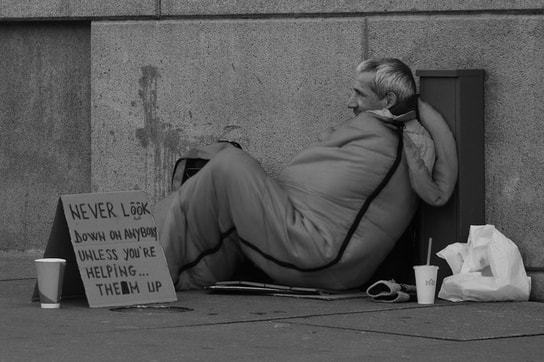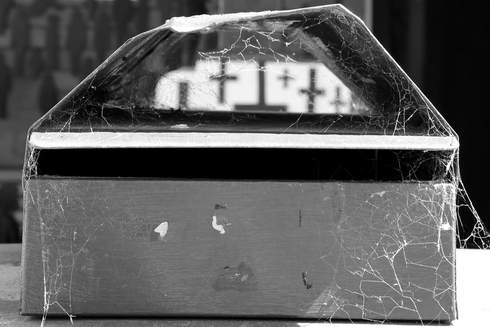Unseen
by Megan Buxton
I’ve become one of the rough-sleepers I used to cross the road to avoid; a dweller in doorways and alleys.
The shopping trolley beside me is loaded with plastic bags, crammed full of my possessions – what is left of them. So many things that held meaning for me are gone – and with each one a little bit of me is lost, another tie to my old life is severed.
I look at the trolley and shake my head; I can’t believe it, can’t understand how this became my life. The home I had was no grand mansion but it suited me. It was an extension of my self. Its familiar scents and familiar spaces gave me the certainty of belonging; they connected me.
Home was taken for granted; it was a place you’d always had, a place you would always have. I’d never thought about what might happen if it were taken from me, what I might lose.
I know now.
After my husband died I learned that the love of his life had not been me, but gambling. He wasn’t good at it. Everything, including my home, was washed away before a tsunami of debt. Friends let me couch-surf but when I couldn’t find work – who wants to employ a sixty-two year old, unskilled woman? – their invitations became cooler. And I hated the hot twist of humiliation when I had to ask. I was sure, even as I took to the streets, that it wouldn’t be for long.
How wrong I was. Without a job I can’t find a place to call my own; without a permanent address I can’t get a job. People try to help but everything is just a Band-Aid on an ever-deepening wound.
At first I thought the nights were the worst, I trembled through the long hours of the night, afraid that someone would steal my things. Or worse. So many of the women I meet tell me about being beaten and raped. They don’t report it, barely acknowledge it, but the pain is with them always. I see it in their eyes. I have been spared that – so far.
There are places I have found where I can be hidden; where I am, if not safe, then at least a little less vulnerable. The fear is not gone but I have learned to live with it.
And I have decided that the nights are not the worst.
In sleep I can forget that my life has no purpose, can forget the daylight hours of frustration and tedium.
Darkness spares me humiliation.
In the daylight I am seen. And judged.
If I sat in the park without my trolley and my plastic bags people would see me. They would see a shabby and dowdy older woman– there’s no money for hairdressing or make-up, no bathroom in which to primp and preen- but they would see me. I’d be somebody sitting in the park.
But when I sit in the park or on the footpath with my bags around me, the people passing by don’t look at me – they look past me, above me, through me.
I am nobody. I am invisible.
by Megan Buxton
I’ve become one of the rough-sleepers I used to cross the road to avoid; a dweller in doorways and alleys.
The shopping trolley beside me is loaded with plastic bags, crammed full of my possessions – what is left of them. So many things that held meaning for me are gone – and with each one a little bit of me is lost, another tie to my old life is severed.
I look at the trolley and shake my head; I can’t believe it, can’t understand how this became my life. The home I had was no grand mansion but it suited me. It was an extension of my self. Its familiar scents and familiar spaces gave me the certainty of belonging; they connected me.
Home was taken for granted; it was a place you’d always had, a place you would always have. I’d never thought about what might happen if it were taken from me, what I might lose.
I know now.
After my husband died I learned that the love of his life had not been me, but gambling. He wasn’t good at it. Everything, including my home, was washed away before a tsunami of debt. Friends let me couch-surf but when I couldn’t find work – who wants to employ a sixty-two year old, unskilled woman? – their invitations became cooler. And I hated the hot twist of humiliation when I had to ask. I was sure, even as I took to the streets, that it wouldn’t be for long.
How wrong I was. Without a job I can’t find a place to call my own; without a permanent address I can’t get a job. People try to help but everything is just a Band-Aid on an ever-deepening wound.
At first I thought the nights were the worst, I trembled through the long hours of the night, afraid that someone would steal my things. Or worse. So many of the women I meet tell me about being beaten and raped. They don’t report it, barely acknowledge it, but the pain is with them always. I see it in their eyes. I have been spared that – so far.
There are places I have found where I can be hidden; where I am, if not safe, then at least a little less vulnerable. The fear is not gone but I have learned to live with it.
And I have decided that the nights are not the worst.
In sleep I can forget that my life has no purpose, can forget the daylight hours of frustration and tedium.
Darkness spares me humiliation.
In the daylight I am seen. And judged.
If I sat in the park without my trolley and my plastic bags people would see me. They would see a shabby and dowdy older woman– there’s no money for hairdressing or make-up, no bathroom in which to primp and preen- but they would see me. I’d be somebody sitting in the park.
But when I sit in the park or on the footpath with my bags around me, the people passing by don’t look at me – they look past me, above me, through me.
I am nobody. I am invisible.


